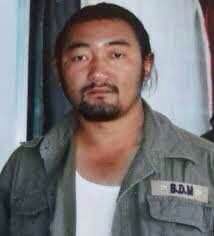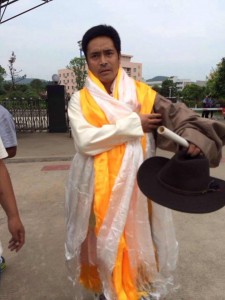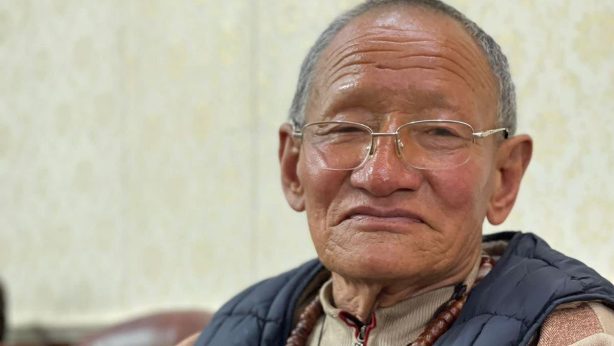Tibetan writers Jangtse Donkho and Buddha released from prison
“The greatest mental suffering of Tibetans is not that there is no place to complain about their sufferings but that they are not allowed to complain.”
~ Nyen

Two Tibetan writers, Jangtse Donkho (pen name: Nyen/“The Wrathful”) and Buddha were released earlier today on 20 June 2014 after serving four years in Mianyang Prison in Sichuan Province.
Jangtse Donkho was arrested on 21 June 2011 from his home in Ngaba (Ch: Aba) County and accused of writing a “reactionary” essay entitled ‘What Human Rights Do We Have Over Our Bodies?’ which commented on the Chinese government’s bloody suppression of the 2008 Uprising. The essay was published in the Shar Dungri (Eastern Snow Mountain) literary journal, which was later banned. Jangtse Donkho was 33 at the time of his arrest. Before his arrest, he was working as a researcher at Kyungchu (Ch: Qiongxi) town, Ngaba Tibetan and Qiang Autonomous Prefecture, Sichuan Province. Donkho wrote the book Rolang (Eng: ‘Zombie’) and along with Buddha, edited a few more journals including Du Rab Kyi Nga (Eng: ‘Consciousness of the Century’).
Buddha is a writer, poet, and medical doctor whose work is regarded as influential in Tibetan society. He was detained on 26 June 2011 at the hospital where he worked in Ngaba County town. He was 34 at the time. His essay ‘Hindsight and reflection’ published in Shar Dungri uncovered the Chinese government’s propagandistic version of the 2008 Tibetan uprising:
“On TV and in the newspapers they say the demonstrations were intended to obstruct and oppose China’s emergence as a great power and the improvement of the living standards of the Tibetan nationality. Supposing that such things were true, some questions must be asked. If the living standards of Tibetans had really improved so much, why would they feel so unhappy as to try to stop this? If Tibetan living standards are so developed, and the demonstrations were exclusively Tibetan, why should their not enjoying a ‘decent standard of living’ be greeted with such dismay?” [ICT Translation, click here for more.]
Both writers were accused of inciting separatism through their writings. Chinese authorities have consistently used Articles 103 and 105 of the Criminal Code as a tool to silence criticism and dissent from inside Tibetan areas as being “reactionary” or“splittist.” Both articles are linked with China’s “State Security Law,” which proscribes “any act endangering the security, honor, and interests of the State.” In application, Chinese courts “make no attempt to assess whether the speech in question posed an actual threat to national security.”

The vague wording of China’s national security crimes provides police and prosecution authorities with wide discretion for the abusive suppression of freedom of expression. Chinese authorities have always expanded the scope of activities criminally punishable as splittist or subversive to include peaceful, internationally protected forms of expression. Essays, books, blog posts, and songs that express Tibetan identity, honestly convey the experience of being Tibetan under Chinese rule, or are otherwise inconsistent with Party policy, are being targeted; the authors, artists, and intellectuals responsible for them are being detained and imprisoned.
Jangtse Donkho’s essay ‘What Human Rights Do We Have Over Our Bodies?’ was published in Vol. 21 of the Shar Dungri journal in 2008. In the essay, Donkho exposed the state-sponsored violence inflicted on the Tibetan people in the aftermath of the 2008 uprising in Tibet. Bearing witness to the violence, he documented the death of specific Tibetans who were killed by the state security forces in Ngaba County (Sichuan Province):
“Shikalo, a man in his 40’s from Charo Township in Ngaba, was beaten to death. This father who was the cornerstone of his household left behind him a widow and three orphans in grief. Toesam and Jinpa, two monks from Ngaba’s Kirti Monastery, were forced to take their own lives because they were unable to bear torture in prison.”
The essay also condemned how the state media exploited the protests, showcasing it to the outside world as ethnic conflict between Tibetans and Chinese, rather than the government taking responsibility for causing “darkness, cruelty, occupation, oppression … spilling blood in our homeland,’ which Donkho asserted were the true cause of Tibetan resentment:
“It’s just like the Tibetan proverb ‘getting angry with the Yak but whipping the horse’. There was no contradiction between Tibetans and Chinese but opposition to the state soon became a fight between the two. The TV, newspapers and so on have become tools for the power-holders to defend themselves. Any one who thinks that they can tell the truth must be crazy.”
The essay did not spare the Tibetan elites working with the Chinese state for failing to stand up for what he calls as “our rights and viewpoints.” They were criticized for doing the state’s bidding by regurgitating the official Chinese narrative of the 2008 protests as “orchestrated by the conspiracy of the Dalai clique” and defending the state-sponsored violence as “a necessity to safeguard law and order.”
In the essay, Donkho warned that the government’s reliance on brute force to quell the Tibetan people’s demand for their rights would be a mere futile exercise. Instead, he portended that they would cause further resentment and more protest in future. He alluded to the possibility of Tibetans resorting to more desperate and severe forms of protest if the Chinese government did not reverse their policy of “enforcing stability through violence, fear and terror”:
“On closer consideration, even if this current disturbance can be quelled with armed force, the wounds thereby inflicted and stench of the spilled blood have filled the minds of the coming generation […] the present situation in our society is that people are hiding indoors with pain in their hearts. Our pleas for freedom, equality and happy life are considered illegal and criminal. What is our real reason for living?”
Since 2009, more than 130 Tibetans inside Tibet have set themselves on fire, out of which 118 died, calling for “human rights, freedom, and the return of the Dalai Lama to Tibet.” The series of self-immolation proved a turning point in the way Tibetans protest.
The Tibetan Centre for Human Rights and Democracy (TCHRD) welcomes the release of Jangtse Donkho and Buddha, who were unjustly imprisoned for peacefully exercising their right to freedom of expression and opinion. Four years after their arrest and imprisonment, the Chinese authorities continue to carry out abusive political prosecutions to silence critics and maintain its authoritarian rule over Tibet. The peacefully expressed opinion and activity of Tibetans such as Jangtse Donkho and Buddha posed no actual threat to state security.
Despite recent pronouncements from the Chinese leadership to respect and promote ‘rule of law’ and introduce judicial reforms, there has been no change in the way the Chinese government exploits vague, overbroad state security law as legal tools to press politically motivated charges against Tibetans who peacefully express their discontent with Chinese rule. So long as the Chinese judiciary directly serves Party objectives and wields legal tools in order to stifle freedom of expression in Tibet, Tibetans will continue to be victimized for exercising their basic rights and fundamental freedoms.


